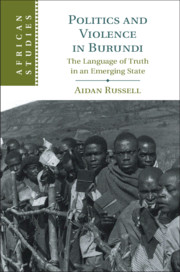
- Cited by 8
-
Cited byCrossref Citations
This Book has been cited by the following publications. This list is generated based on data provided by Crossref.
Desrosiers, Marie-Eve and Russell, Aidan 2020. Histories of authority in the African Great Lakes: trajectories and transactions. Africa, Vol. 90, Issue. 5, p. 952.
Østebø, Terje 2020. Islam, Ethnicity, and Conflict in Ethiopia.
Pailey, Robtel Neajai 2021. Development, (Dual) Citizenship and Its Discontents in Africa.
2021. Revolutionary State-Making in Dar es Salaam. p. 330.
2021. Race and Diplomacy in Zimbabwe. p. 346.
Mikalachki, Jodi 2024. Reimagining Violence in Contemporary Africa: Catholic Martyrdom and the Ethics of Sacrificial Solidarity in Burundi. Religions, Vol. 15, Issue. 5, p. 581.
Khalid, Mu’izz Abdul 2024. Civic Subjecthood: The Hybridization and Reformulation of Subjecthood and Citizenship in Brunei. Critical Asian Studies, Vol. 56, Issue. 3, p. 447.
2024. Black Soldiers in the Rhodesian Army. p. 283.
- Publisher:
- Cambridge University Press
- Online publication date:
- October 2019
- Print publication year:
- 2019
- Online ISBN:
- 9781108581530
- Subjects:
- Area Studies, African Studies, History, African History
- Series:
- African Studies (145)


